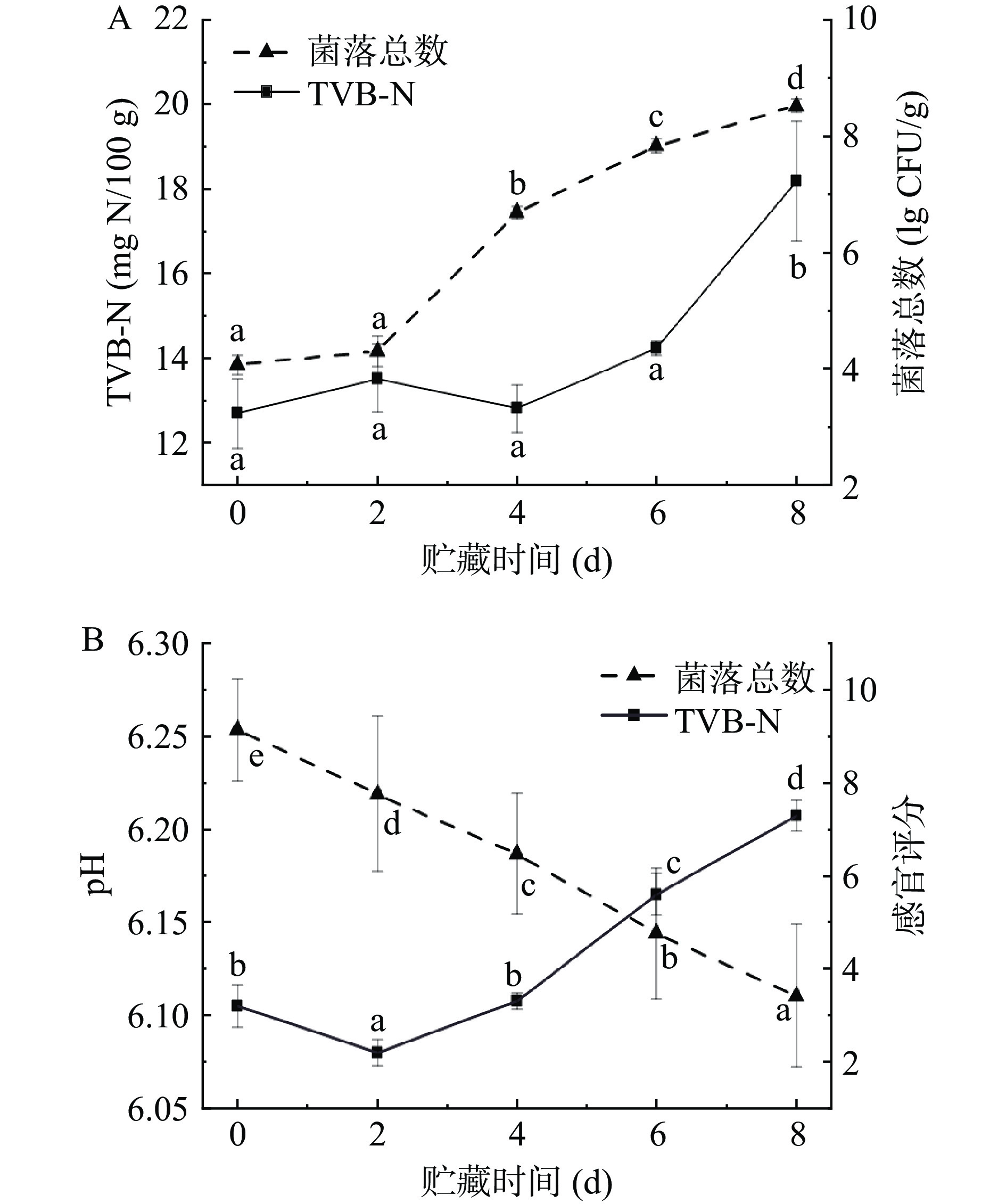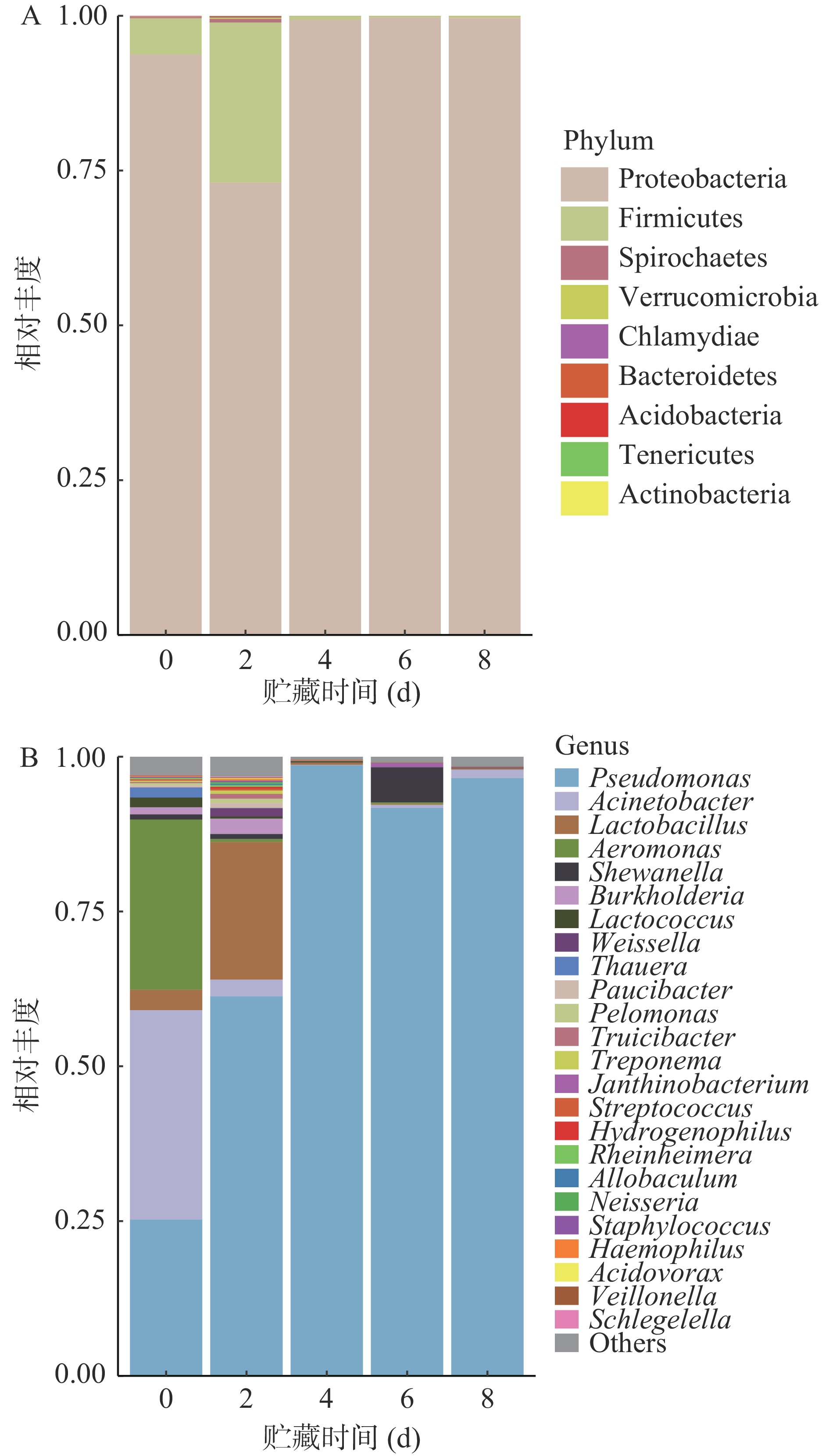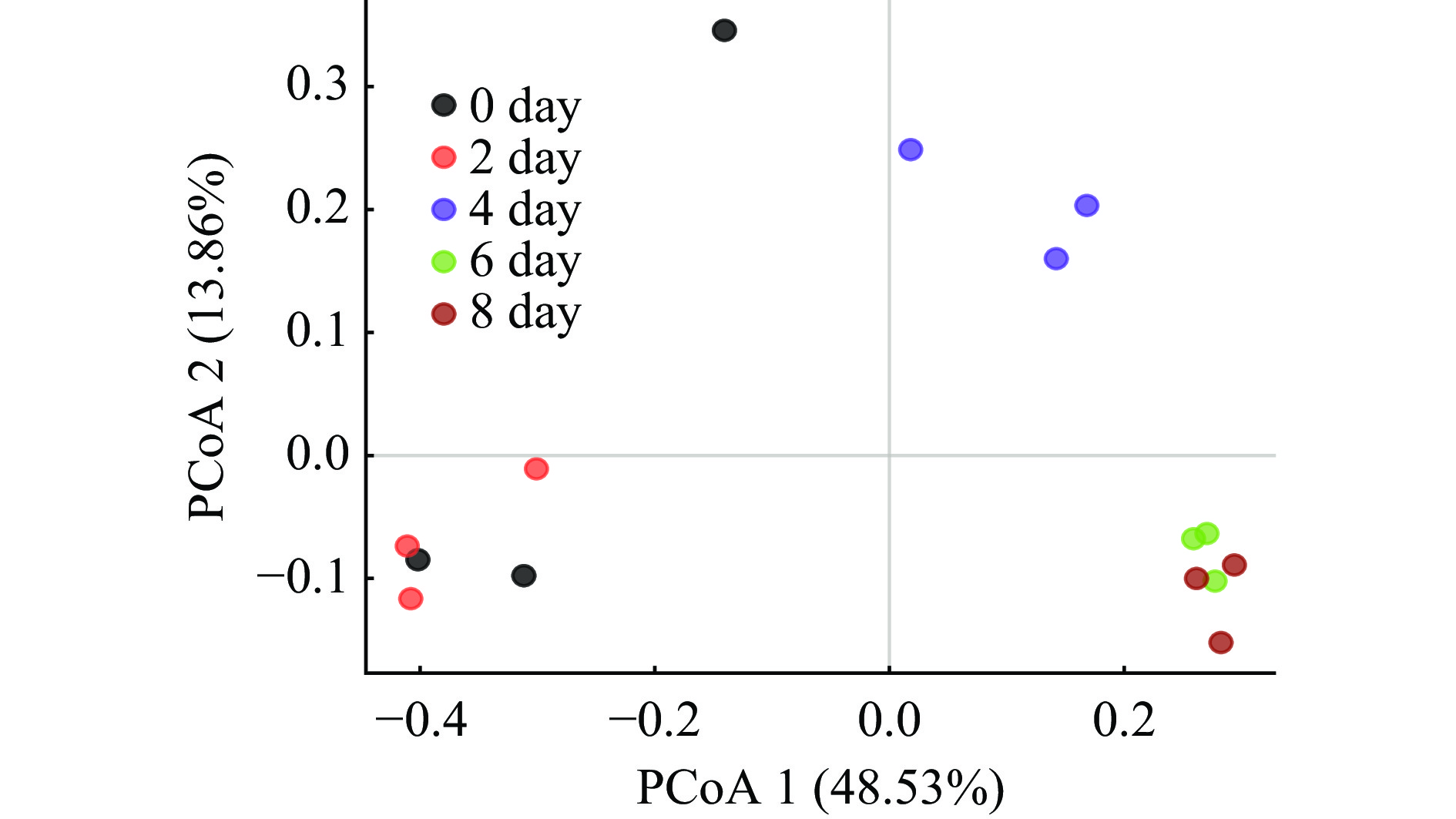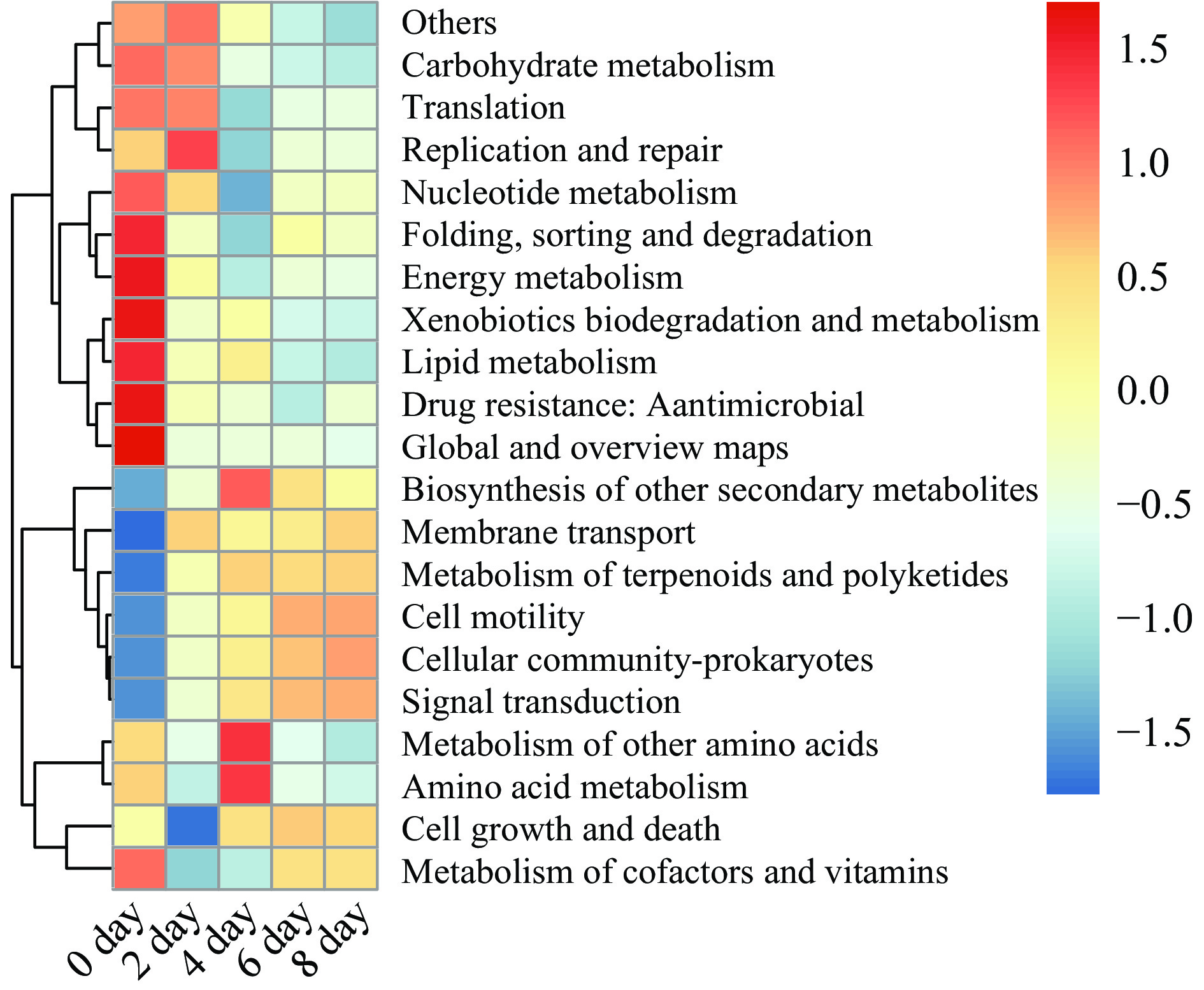Microbial Community Structure and Function Succession of Puffer Fish (Takifugu obscurus) During Refrigeration
-
摘要: 目的:探究暗纹东方鲀(Takifugu obscurus)冷藏期间的微生物群落结构与功能变化规律,明确贮藏过程的优势菌属。方法:通过高通量测序技术研究冷藏期间(4 ℃,8 d)暗纹东方鲀细菌群落结构组成与变化规律,利用Tax4Fun2软件进行细菌群落功能预测,并测定其挥发性盐基氮(Total Volatile Basic-N,TVB-N)、pH、感官评分等指标变化。结果:高通量测序表明贮藏期间样品细菌群落发生显著变化,初期的主要菌属有不动杆菌属(Acinetobacter)、乳杆菌属(Lactobacillus)、气单胞菌属(Aeromonas)、假单胞菌属(Pseudomonas)等,贮藏后期假单胞菌属(Pseudomonas)的相对丰度增至91.7%以上,成为优势菌属。贮藏初期α多样性指数较高,贮藏后期明显降低。细菌群落功能预测结果显示贮藏后期的氨基酸代谢、细胞交流、膜运输等功能通路丰度升高。贮藏后期样品pH、挥发性盐基氮值、菌落总数呈上升趋势,感官评分呈下降趋势。结论:样品贮藏过程中,微生物群落结构与功能发生明显演替,假单胞菌属(Pseudomonas)是贮藏过程中的优势菌属;该结果可为暗纹东方鲀后续相应保鲜技术的开发提供理论指导。Abstract: Objective: To reveal the microbial community and its function succession principles of puffer fish (Takifugu obscurus), and to identify the dominant microbial genera on puffer fish during refrigerated storage. Methods: High-throughput sequencing was employed to investigate the microbial composition of puffer fish during refrigeration (4 ℃, 8 d), the community function was predicted by Tax4fun2, and the total volatile basic-nitrogen (TVB-N), pH and organoleptic values of puffer fish were measured as well. Results: The high-throughput sequencing demonstrated that during refrigeration the bacterial community of puffer fish succeed significantly, which were mainly composed of genera Acinetobacter, Lactobacillus, Aeromonas and Pseudomonas at the initial stage, while at the last stage composed almost of genera Pseudomonas (>91.7%), which was considered as the dominant genera on puffer fish. The α-diversity index of the community was higher at initial stage, while decreased during the storage. The microbial community function prediction results showed that the relative abundance of the amino-acid metabolism pathway and the cellular communication pathway increased at the last stage of the storage. As for the physicochemical properties, TVB-N, pH and total microbial counts increased while sensory scores decreased during the storage. Conclusion: The microbial community and its functional profile changed significantly during refrigeration, Pseudomonas was the dominant genera of puffer fish, and the above conclusion would provide theoretic guidelines for developing novel preserving technology for puffer fish.
-
暗纹东方鲀(Takifugu obscurus),俗称河豚,是一种食用历史悠久的海淡水养殖鱼类,营养丰富,滋味鲜美,富含氨基酸和鲜味肽等[1-2],受到广大消费者喜爱,近年来产量逐年上升[3-4]。目前市场上主要采用低温储存的方式对河豚制品进行保鲜,然而在贮藏过程中仍会产生腐败变质现象[5]。在低温环境下,大部分细菌的生长繁殖被抑制,但仍有部分优势细菌适应低温环境大量生长繁殖并分解肉类组织,是造成产品腐败的主要原因[6]。了解低温环境下微生物群落的变化规律对控制水产品腐败变质、发展新型保鲜技术具有重要的参考意义。Hanan等[7]发现不同水产品初始细菌群落通常均包含核心菌属,如假单胞菌属、发光杆菌属、嗜冷菌属等,这与其生长环境中菌群构成相似有关。鱼类自身组织营养及加工贮藏条件差异会导致不同物种在贮藏过程中各菌属的变化规律不完全相同,形成各自特异的优势菌属[8],因此对不同水产品有必要具体分析其菌群结构变化规律。
高通量测序技术以分子生物学为基础,依据微生物16S rDNA序列进化关系来分析样品微生物的种属信息[9],具有测序通量高、准确度高、成本较低等特点,克服了传统培养法培养条件单一,检测通量较小等[10-11]缺点,可以更为真实全面地反映微生物群落组成信息,利用高通量测序技术研究发现三文鱼中优势微生物以假单胞菌与发光杆菌属为主[12],带鱼中以嗜冷杆菌属为主[13],鲈鱼中以假单胞菌属、不动杆菌属、希瓦氏菌属、嗜冷杆菌属为主[14]。李秀秀[15]通过高通量测序明确冷藏草鱼中优势菌属为气单胞菌属并据此筛选出特异性高效生物保鲜剂,具有良好保鲜效果;Wang等[16]也明确海鲷鱼中优势腐败菌属为气单胞菌属,在此基础上针对性应用气单胞菌群体感应抑制酶PF2571,有效抑制优势腐败菌造成的腐败,增进了保鲜效果。了解水产品中优势腐败菌信息有助于开发针对性保鲜技术,提高保鲜效果。目前针对暗纹东方鲀冷藏鱼肉产品菌群结构研究暂未见报道,故本研究拟采用高通量测序技术研究其贮藏期间菌群结构变化规律,明确其优势菌属并对微生物群落功能变化进行预测分析,以期增进对暗纹东方鲀冷藏期间菌群结构与功能变化的认识并为下一步的保鲜技术开发提供参考。
1. 材料与方法
1.1 材料与仪器
暗纹东方鲀 淡水养殖,平均尾重约450±50 g,2021年3月份购于广东金洋水产养殖有限公司;TIANamp bacteria DNA extraction kit试剂盒 北京天根生物公司;PrimeSTAR HS kit 北京Takara生物科技公司;QIAamp DNA stool extraction kit试剂盒 德国QIAamp公司;TransStart FastPfu DNA Polymerase试剂盒 北京全式金生物公司;平板计数琼脂 广东环凯微生物公司;其他分析试剂 均为国产分析纯。
PB10型pH计 德国Sartorius公司;Kjeltec8400型凯氏定氮仪 丹麦FOSS公司;5810R高速冷冻离心机 德国Eppendorf公司;T-25型匀浆机 德国IKA公司;milli-Q Elix纯水仪 美国Merck公司;BCD-460型冰箱 青岛海尔公司;905GP超低温冰箱 美国Thermo Fisher公司。
1.2 实验方法
1.2.1 样品处理与贮藏
选用广东金洋水产公司的养殖河豚,按照GB/T 39122-2020《养殖暗纹东方鲀鲜、冻品加工操作规范》进行宰杀清洗[17],彻底进行放血、去皮、去内脏后,碎冰贮藏1 h内送至实验室。在实验室无菌条件下先沿背部脊骨切开鱼肉、去除鱼骨,再横向切分成约2 cm×3 cm×1 cm的鱼片,随机挑取鱼片并用无菌塑料袋包装后置于4 ℃冰箱中贮藏,于第0、2、4、6、8 d随机取样测定相关指标。
1.2.2 菌落总数测定
参照GB 4789.2-2016《食品安全国家标准 食品微生物学检验 菌落总数测定》中的方法进行[18],将平板计数琼脂放置在30 ℃培养3 d后计数,结果表述为lg CFU/g。
1.2.3 理化指标测定
挥发性盐基氮值(total volatile basic-N,TVB-N)按照GB 5009.228-2016《食品安全国家标准 食品中挥发性盐基氮的测定》中全自动凯氏定氮仪法进行[19],pH测定参照Zhou等[1]方法进行,取5 g鱼肉剪碎,加入45 mL纯净水后,12000 r/min冰浴匀浆60 s后测定pH。
1.2.4 感官评定
参照冯豪杰等[20]方法进行,由5位食品专业人员组成感官评定小组,对样品颜色、弹性、形态、气味四个项目进行感官评分,以各项目评分平均值为最终得分。具体评价标准见表1。
表 1 暗纹东方鲀感官评分标准Table 1. Criteria for sensory evaluation of Takifugu obscures评价项目 9~10分 7~8分 5~6分 3~4分 1~2分 色泽 非常明亮 明亮 稍暗淡 暗淡 非常暗淡 弹性 结实有弹性 有弹性 柔软有弹性 无弹性 柔软 形态 非常清晰 清晰 稍清晰 模糊 松散,发粘 气味 正常 稍鱼腥味 鱼腥味 轻微腐败 腐败臭味 1.2.5 高通量测序
在各时间点随机选择样品,储存于−80 ℃冰箱后,统一干冰寄送至深圳易基因公司进行Illumina Miseq PE250高通量测序。
使用QIAamp DNA stool extraction kit并按照说明书提取样品基因组总DNA,并用1%琼脂糖凝胶电泳检测提取总DNA质量。使用TransStart FastPfu DNA Polymerase试剂盒,按说明书对16S rDNA V3~V4高变区片段进行扩增。扩增引物:338F(5’-ACTCCTACGGGAGGCAGCA-3’)及806R(5’-GGACTACHVGGGTWTCTAAT-3’)。PCR反应条件:94 ℃ 3 min;94 ℃ 45 s,50 ℃ 60 s,72 ℃ 90 s,25个循环;72 ℃ 10 min。扩增产物经磁珠纯化后,构建文库,利用Illumina Miseq平台进行高通量测序。
使用Vsearch(v2.7.1)软件对原始双端测序数据进行去引、拼接及质控[21]。在QIIME2(version2020.11)分析软件中[22]对拼接后的序列进行进一步处理:使用dada2插件去噪(包含去嵌合体等步骤)并生成可分类单元(operation taxonomic unit,OTU)表格;使用99% identity SILVA(release 132)V3~V4分类器给OTU代表序列添加物种注释信息;使用core-diversity-metrics插件计算序列α多样性指数与β多样性距离矩阵。采用Tax4Fun2软件[23]参考KEGG(Kyoto Encyclopedia of Genes and Genomes)数据库对测序数据进行细菌群落功能预测分析。
1.3 数据处理
所有指标均随机选取3个样品重复测定,采用SPSS Statistics 20.0进行单因素方差分析与显著性分析(Duncan’s多重比较法,P<0.05),采用Origin2021与R4.0.5绘图。
2. 结果与分析
2.1 菌落总数、理化指标与感官评分
贮藏期间河豚鱼肉各品质变化情况如图1所示。在冷藏条件(4 ℃)下河豚鱼肉中微生物仍能快速生长,样品初始菌落总数(0~2 d)维持在4.07 lg CFU/g左右,贮藏后期逐渐升高,8 d时达到8.50 lg CFU/g。样品的TVB-N值在贮藏后期显著升高(P<0.05),在8 d时增至18 mgN/100 g,接近标准限值(20 mgN/100 g)。pH在贮藏期间先呈现下降趋势,后逐渐升高,2 d时pH最低为6.08,8 d时pH最高,为6.32。感官评分在贮藏期间逐渐降低,从0 d时9.15降至8 d时的3.43,贮藏后期样品感官质量明显降低,出现腐败臭味,组织软化,表面发粘液化等现象,表明肌肉组织发生降解。水产品中营养丰富,能为微生物生长提供良好条件[10],微生物生长代谢产生大量胞外蛋白酶、脂酶等,降解肌肉组织并生成大量代谢副产物,如挥发性有机物、生物胺等,造成样品感官理化变化[24],使样品发生腐败。本研究中,微生物生长并伴随着TVB-N,pH的升高以及感官质量的劣化,说明微生物生长是其品质变化的主要影响因素,这与冯豪杰等研究结果一致[20]。He等[25]研究表明微酸性电解水冰能有效抑制南美白对虾pH、TVB-N的升高与感官品质的劣变,这与其能有效抑制对虾中微生物生长有关,说明微生物生长对产品品质劣变具有重要影响,控制微生物生长是生鲜水产品保鲜的关键。
![]() 图 1 贮藏期间微生物理化指标变化注:A:菌落总数,TVB-N值;B:感官评分,pH;图中不同字母表示样品间差异显著(P<0.05);表2同。Figure 1. Microbial and physicochemical values change during storage
图 1 贮藏期间微生物理化指标变化注:A:菌落总数,TVB-N值;B:感官评分,pH;图中不同字母表示样品间差异显著(P<0.05);表2同。Figure 1. Microbial and physicochemical values change during storage2.2 高通量测序分析细菌群落结构
2.2.1 细菌群落α多样性分析
α多样性指数中,Chao1指数和OTU数量反映物种种类数目多样性,Shannon指数表示微生物群落的物种种类数量及其分布均匀度,覆盖率(Good's coverage)表示所有不是单个体物种在总样本中的比例,随着测序深度的增加,若物种的数量不再增加,说明测序达到了饱和[26-27]。由表2可知,各组样品覆盖率均大于99.97%,说明测序深度合理,能够较为完整反映样品细菌群落信息;0~2 d的OTU数、Chao1指数显著(P<0.05)高于其他时间组,Shannon指数略高于其他时间组,说明贮藏前期样品细菌群落中物种数量较多且均匀度较高,而贮藏后期物种种类减少且均匀度下降,贮藏期间河豚样品细菌群落α多样性呈现明显降低趋势。生鲜水产品冷藏与腐败过程中,普遍呈现细菌群落α多样性下降、优势菌属丰度上升的现象[7],此外,不同的加工处理(如干制、腌制、烟熏等)也会显著降低鱼类菌群α多样性[8,28]。
表 2 贮藏期间细菌群落α多样性指数Table 2. α-diversity index of the bacterial community during storage贮藏时间(d) 覆盖率 OTU数 Shannon指数 Chao1指数 0 >99.98%a 101.3±34.8b 3.29±0.3a 103.4±35.5b 2 >99.99%a 130.7±23.3c 3.51±0.67a 134.1±20.9c 4 >99.98%a 39.3±5.6a 2.37±0.34a 41.9±4.2a 6 >99.97%a 59.0±3.7a 2.47±0.58a 62.5±0.7a 8 >99.99%a 49.3±10.4a 2.36±0.41a 50.2±10.8a 2.2.2 细菌群落结构分析
测序样品中共检测到411个OTU,分属于9个门,16个纲,36个目,46个科,75个属。门分类水平上(图2A),厚壁菌门(Firmicutes)和变形菌门(Proteobacteria)为主要菌门。贮藏0 d及2 d时,厚壁菌门(Firmicutes)的相对含量为4.95%、27.5%,而贮藏至4、6、8 d时,其相对含量降至低于1%。变形菌门(Proteobacteria)在整个贮藏期间均保持相对较高含量,在0、2 d的相对含量分别为94.7%、71.3%,4 d后均高于99%,是贮藏期间的优势菌门。冷藏南美白对虾中初始菌群主要由厚壁菌门与变形菌门组成,而变形菌门相对丰度在贮藏末期上升至85%[25],与本研究类似。相关研究发现[8]冷藏期间牛肉、禽肉中厚壁菌门为优势菌门,水产品中变形菌门为优势菌门,这是因为水产品生长生态环境中富含变形菌门,对其初始菌群结构造成影响。
属分类水平上,对相对含量最高的25个菌属进行绘图分析(图2B)。0 d时样品细菌群落中细菌种类丰富,含量较为均匀,相对丰度超过1%的菌属达8个,其中假单胞菌属(Pseudomonas)、不动杆菌属(Acinetobacter)、气单胞菌属(Aeromonas)、乳杆菌属(Lactobacillus)相对丰度分别为25%、34%、28%、3.3%,共约90%,而其他菌属的相对含量较低。第2 d时,不动杆菌属(Acinetobacter)相对含量降至2.7%、气单胞菌属(Aeromonas)显著(P<0.05)降低至0.5%,而假单胞菌属(Pseudomonas)升至61.2%、乳酸杆菌属(Lactobacillus)显著(P<0.05)升高至22.2%,其他菌属相对丰度均低于1%。贮藏后期假单胞菌属(Pseudomonas)的相对丰度显著(P<0.05)升高,在4、6、8 d时分别为98.6%、91.7%、96.5%,而其他菌属相对含量进一步降至0.1%以下,表明假单胞菌属是河豚样品冷藏期间优势菌属。值得注意的是6 d时部分样品中希瓦氏菌属(Shewanella)相对丰度出现波动,达到5.62%,8 d时不动杆菌属(Acinetobacter)相对含量达到1.5%,这可能是样品表面菌群分布不均匀产生了一定误差[10]。
食品中贮藏初期及贮藏末期菌群构成受到多种因素影响,Chaillou等认为水产品初始菌群受到其生长环境菌群、肠道菌群等影响,水产品之间差异性较小,而与牛肉、禽类等陆生生物的差异性较大;在贮藏过程中,食品组织基质、储存条件等差异对各菌属产生筛选效应从而形成不同的优势菌属[8]。相关研究发现草鱼[10]、三文鱼[12]、罗非鱼[29]等的优势腐败微生物均包括假单胞菌属,其相对丰度在贮藏过程中逐渐升高,与本研究结果类似。假单胞菌属广泛存在于鱼类的生长环境与加工过程中[30-31],容易造成水产品的假单胞菌污染,可能是本研究中河豚鱼样品污染假单胞菌的原因之一。
为了进一步分析各菌属变化趋势差异,绘制其相对丰度热图并进行聚类分析。结果(图3)显示,不同菌属具有不同变化趋势并聚为3类,不动杆菌属(Acinetobacter)、气单胞菌属(Aeromonas)、乳球菌属(Lactococcus)等为第一类,其特点为初期(0 d)相对丰度最高,而在储存过程中丰度显著降低,可能因其不能适应低温环境使其丰度持续降低,Chaillou等研究也表明低温对水产品菌群造成一定的选择压力[8];魏斯氏菌属(Weissella)、乳杆菌属(Lactobacillus)等为第二类,其特点为在贮藏初期(2 d)其相对丰度有所升高,而在中后期持续降低至低丰度水平,可能原因是其低温环境下组织降解与蛋白质代谢能力较差,碳源氮源利用效率低致其生长速度缓慢而处于竞争劣势,后期细菌丰度不断降低;假单胞菌属(Pseudomonas)、希瓦氏菌属(Shewanella)等被聚为第三类,在贮藏过程中,其相对丰度呈现出持续上升的趋势,其中假单胞菌属从0 d的24.4%升至4 d的91.7%,并维持在此水平,是河豚冷藏过程中的优势菌属。假单胞菌属是一种好氧嗜冷微生物,0~5 ℃下也能在鱼肉样品中快速生长[32]并具有较强的蛋白质降解能力、生物黏附能力与生物膜形成能力[33-34],易造成水产品的腐败,是水产品中普遍存在的优势腐败菌。以上特点使假单胞菌属在环境适应与营养利用方面占据优势而不断生长,成为优势菌属,因此控制其在水产品中低温生长及致腐能力是产品保鲜的关键,目前采用香芹酚[35]、单萜烯[36]、群体感应抑制剂等[16]技术针对性控制假单胞菌属造成的动物源食品腐败表现出良好抑制效果,具有进一步生产应用潜力。
2.2.3 细菌群落PCoA分析
对所有样品细菌群落数据进行主坐标分析(Principle Coordinate Analysis,PCoA)(图4),分析结果显示,在轴PCoA 1上,0、2 d样品距离较近,6、8 d样品距离较近,说明这些样品间细菌群落相似性高;贮藏前期、后期样品位置区分明显,说明贮藏前期与贮藏后期样品菌群结构差异明显,贮藏期间样品微生物群落发生演替变化,PCoA分析结果与2.2.2中的实验结果相一致。相关研究利用PCoA分析发现碎牛肉在贮藏初期与贮藏末期位置变化较小,而三文鱼等水产品前后变化显著,说明贮藏期间不同物种间菌群结构变化程度有差异[8]。本研究中河豚鱼贮藏期间菌群结构变化差异性较大,这与鲈鱼贮藏期间变化相类似[14]。
2.2.4 细菌群落功能预测
利用高通量测序得到序列信息,可以预测分析样本微生物群落在基因,蛋白质及更高层面代谢网络的功能特征[37]。本次实验中各组样品细菌群落代谢功能预测结果(图5)显示,样品细菌群落的KEGG二级功能通路依据变化特征的差异可分为2类,第一类功能通路共同变化趋势为贮藏前期0、2 d的丰度较低,而贮藏后期4、6、8 d的丰度较高,包括氨基酸代谢(Amino acid metabolism)、二级代谢产物生成(Biosynthesis of other secondary metabolites)、其它氨基酸代谢(Metabolism of other amino acids),信号转导(Signal transduction)、膜运输(Membrane transport),细胞移动(Cell motility)、细胞群落交流(Cellular community-prokaryotes)(包含生物膜形成功能)等二级功能通路。第二类功能通路变化趋势与第一类功能通路相反,特征为贮藏前期功能丰度较高,而后期的功能丰度降低,包括能量代谢(Energy metabolism)、脂质代谢(Lipid metabolism)、碳水化合物代谢(Carbohydrate metabolism)等二级功能通路。
针对假单胞菌(Pseudomonas fluorescens PF08)的全基因组功能分析结果表明[37],其涉及氨基酸代谢、膜运输、信号转导、细胞群落交流等群体感应系统相关功能基因数量较多,相关通路丰度较高。结合本研究贮藏期间菌属变化情况发现,贮藏后期假单胞菌属丰度升高的同时,信号转导,细胞群落交流等第一类功能通路丰度上升,表明假单胞菌属相对丰度变化与菌群部分功能丰度变化相关性高,假单胞菌的细胞群体感应现象加强。群体感应系统能够调控细菌群体代谢功能的转变,加强其二级代谢产物合成,使其胞外蛋白酶,胞外多糖等分泌增多,蛋白质代谢能力增强,造成肌肉组织的降解,挥发性有机物、生物的胺生成及表面黏液的产生[38],从而导致样品的感官、理化等指标的变化,这与2.1中相关指标变化规律相一致,说明本研究中假单胞菌属丰度及其群体感应调控代谢活力升高,导致了河豚样品的腐败。对细菌群体感应现象进行控制也能抑制相关菌属的致腐能力[38],相关研究通过破坏群体感应分子而抑制群体感应系统,可以显著抑制细菌胞外蛋白酶、脂酶、胞外多糖的分泌,降低其移动能力与生物膜生成量,从而抑制其致腐能力,应用于水产品上具有良好的保鲜效果[16,39]。
3. 结论
本研究通过高通量测序揭示了冷藏期间菌群结构的变化趋势,发现假单胞菌属是河豚样品冷藏期间的优势菌属,其丰度在贮藏期间呈现不断上升的趋势。结合功能预测分析发现假单胞菌属的细胞群体感应相关功能较强,具有较强的致腐能力,推测其是造成河豚样品冷藏期间的pH、TVB-N及感官指标变化的主要原因。控制优势微生物的生长是防止水产品腐败的关键因素,本研究已通过高通量测序分析揭示了假单胞菌属是冷藏河豚产品中的优势腐败菌,后续还应测定并验证河豚样品中假单胞菌属致腐能力,并进一步开发出针对性的保鲜技术,延缓产品腐败变质,提升产品保鲜效果。
-
图 1 贮藏期间微生物理化指标变化
注:A:菌落总数,TVB-N值;B:感官评分,pH;图中不同字母表示样品间差异显著(P<0.05);表2同。
Figure 1. Microbial and physicochemical values change during storage
表 1 暗纹东方鲀感官评分标准
Table 1 Criteria for sensory evaluation of Takifugu obscures
评价项目 9~10分 7~8分 5~6分 3~4分 1~2分 色泽 非常明亮 明亮 稍暗淡 暗淡 非常暗淡 弹性 结实有弹性 有弹性 柔软有弹性 无弹性 柔软 形态 非常清晰 清晰 稍清晰 模糊 松散,发粘 气味 正常 稍鱼腥味 鱼腥味 轻微腐败 腐败臭味 表 2 贮藏期间细菌群落α多样性指数
Table 2 α-diversity index of the bacterial community during storage
贮藏时间(d) 覆盖率 OTU数 Shannon指数 Chao1指数 0 >99.98%a 101.3±34.8b 3.29±0.3a 103.4±35.5b 2 >99.99%a 130.7±23.3c 3.51±0.67a 134.1±20.9c 4 >99.98%a 39.3±5.6a 2.37±0.34a 41.9±4.2a 6 >99.97%a 59.0±3.7a 2.47±0.58a 62.5±0.7a 8 >99.99%a 49.3±10.4a 2.36±0.41a 50.2±10.8a -
[1] ZHOU R, LIU Y, XIE J, et al. Effects of combined treatment of electrolyzed water and chitosan on the quality attributes and myofibril degradation in farmed obscure puffer fish (Takifugu obscurus) during refrigerated storage[J]. Food Chemistry,2011,129:1660−1666. doi: 10.1016/j.foodchem.2011.06.028
[2] ZHANG M X, WANG X C, LIU Y, et al. Isolation and identification of flavour peptides from Puffer fish (Takifugu obscurus) muscle using an electronic tongue and MALDI-TOF/TOF MS/MS[J]. Food Chemistry,2012,135:1463−1470. doi: 10.1016/j.foodchem.2012.06.026
[3] 周瑞, 李若男, 周丽莎, 等. 暗纹东方鲀鱼皮胶原蛋白的提取及其特性[J]. 水产学报,2020,44(8):1349−1359. [ZHOU R, LI R N, ZHOU L S, et al. Extraction and characteristics of collagens from the skin of puffer fish (Tetrodontiformes fasciatus)[J]. Journal of Fisheries of China,2020,44(8):1349−1359. ZHOU R, LI R N, ZHOU L S, et al. Extraction and characteristics of collagens from the skin of puffer fish (Tetrodontiformes fasciatus)[J]. Journal of Fisheries of China, 2020, 44(8): 1349-1359.
[4] 农业农村部渔业渔政管理局, 全国水产技术推广总站, 中国水产学会. 2020中国渔业统计年鉴[M]. 北京: 中国农业出版社, 2021: 32-34. Bureau of Fisheries Ministry of Agriculture and Rural Affairs, National Fisheries Technology Extension Center, China Society of Fisheries. China fishery statistical yearbook[M]. Beijing: China Agriculture Press, 2021: 32-34.
[5] ZHAO Y M, ALBA M, SUN D W, et al. Principles and recent applications of novel non-thermal processing technologies for the fish industry—a review[J]. Critical Reviews in Food Science and Nutrition,2019,59(5):728−742. doi: 10.1080/10408398.2018.1495613
[6] ZHUANG S, HONG H, ZHANG L, et al. Spoilage-related microbiota in fish and crustaceans during storage: Research progress and future trends[J]. Comprehensive Review in Food Science Food Safety,2020,20:252−288.
[7] HANAN R, FATIMA M, ROBERT H. Characterization of the microbiota of commercially traded finfish fillets[J]. Food Reaserch International,2020,137:109373. doi: 10.1016/j.foodres.2020.109373
[8] CHAILLOU S, AURELIE C, HELENE C, et al. Origin and ecological selection of core and food-specific bacterial communities associated with meat and seafood spoilage[J]. The ISME Journal,2015,9:1105−1118. doi: 10.1038/ismej.2014.202
[9] 刘驰, 李家宝, 芮俊鹏, 等. 16S rRNA基因在微生物生态学中的应用[J]. 生态学报,2015,35(9):2769−2788. [LIU C, LI J B, RUI J P, et al. The applications of the 16S rRNA gene in microbial ecology: Current situation and problems[J]. Acta Ecologica Sinica,2015,35(9):2769−2788. LIU C, LI J B, RUI J P, et al. The applications of the 16S rRNA gene in microbial ecology: Current situation and problems[J]. Acta Ecologica Sinica, 2015, 35(9): 2769-2788.
[10] JIA S L, ZHUANG S, LEI Y T, et al. Application of Illumina-Miseq high throughtput sequencing and culture-dependent techniques for the identification of microbiota of silva carp (Hypophthalmichthys molitrix) treated by tea polyphenols[J]. Food Microbiology,2018,76:52−61. doi: 10.1016/j.fm.2018.04.010
[11] 李凯凯, 曹伟伟, 文昌丽, 等. 基于高通量测序的稀释平板计数细菌群落变化研究[J]. 微生物学报,2022,62(11):4447−4464. [LI K K, CAO W W, WEN C L, et al. Assessment of differences between high-throughput sequencing and plate-dilution method for microbial ecology study of soils under distinct land use scenarios[J]. Acta Microbiologica Sinica,2022,62(11):4447−4464. LI K K, CAO W W, WEN C L, et al. Assessment of differences between high-throughput sequencing and plate-dilution method for microbial ecology study of soils under distinct land use scenarios[J]. Acta Microbiologica Sinica, 2022, 62(11): 4447-4464.
[12] WANG J, FANG J, WEI L N, et al. Decrease of microbial community diversity, biogenic amines formation, and lipid oxidation by phloretin in Atlantic salmon fillets[J]. LWT-Food Science and Technology,2019,101:419−426. doi: 10.1016/j.lwt.2018.11.039
[13] 高乾坤, 焦琳舒, 杜贺超, 等. 高通量测序分析不同产地带鱼冷藏时微生物群落多样性[J]. 食品科学,2018,39(18):127−132. [GAO Q K, JIAO L S, DU H C, et al. High-throughput sequencing analysis of microbial community diversity of hairtail from different waters during chilled storage[J]. Food Science,2018,39(18):127−132. doi: 10.7506/spkx1002-6630-201818020 GAO Q K, JIAO L S, DU H C, et al. High-throughput sequencing analysis of microbial community diversity of hairtail from different waters during chilled storage[J]. Food Science, 2018, 39(18): 127-132. doi: 10.7506/spkx1002-6630-201818020
[14] 张皖君, 蓝蔚青, 段贤源, 等. 基于高通量测序分析不同保鲜冰处理对鲈鱼菌群组成与代谢功能的影响[J]. 食品科学,2019,40(5):234−241. [ZHANG W J, LAN W Q, DUAN X Y, et al. Analysis of bacterial community composition and its metabolic function in Lateolabrax japonicus with different ice treatments by high-throughput sequencing[J]. Food Science,2019,40(5):234−241. ZHANG W J, LAN W Q, DUAN X Y, et al. Analysis of bacterial community composition and its metabolic function in Lateolabrax japonicus with different ice treatments by high-throughput sequencing[J]. Food Science, 2019, 40(5): 234-241.
[15] 李秀秀. 复合绿色食品保鲜剂对鲫鱼保鲜效果的研究[D]. 南京: 南京农业大学, 2017. LI X X. Study on preservation effect of compound green food preservatives on Carassius auratus[D]. Nanjing: Nanjing Agriculture University, 2017.
[16] WANG D F, CHEN H T, LI J R, et al. Screening and validation of quorum quenching enzyme PF2571 from Pseudomonas fluorescens strain PF08 to inhibit the spoilage of red sea bream filets[J]. International Journal of Food Microbiology,2022,362:109476. doi: 10.1016/j.ijfoodmicro.2021.109476
[17] 国家市场监督管理总局, 国家标准化管理委员会. GB/T 39122-2020养殖暗纹东方鲀鲜、冻品加工操作规范[S]. 北京: 中国标准出版社, 2020: 1-3. State Administration for Market Regulation, Standardization Administration of the People's Republic of China. GB/T 39122-2020 Manufacturing practice for processing of fresh and frozen cultured obscure puffer[S]. Beijing: Standards Press of China, 2020: 1-3.
[18] 国家食品药品监督管理总局, 国家卫生和计划生育委员会. GB 4789.2-2016食品安全国家标准 食品微生物学检验 菌落总数测定[S]. 北京: 中国标准出版社, 2016: 4-6. National Health and Family Planning Commission of the People's Republic of China, State Food and Drug Administration. GB 4789.2-2016 Methods for food microbiology test, determination of total bacterial colonies[S]. Beijing: Standards Press of China, 2016: 4-6.
[19] 国家卫生和计划生育委员会. GB 5009.228-2016 食品安全国家标准 食品中挥发性盐基氮的测定[S]. 北京: 中国标准出版社, 2016: 5−7. National Health and Family Planning Commission of the People's Republic of China. GB 5009.228-2016 National food safety standard, determination of total volatile basic-Nitrogen in food[S]. Beijing: Standards Press of China, 2016: 5−7.
[20] 冯豪杰, 蓝蔚青, 刘大勇, 等. 不同减菌化处理方式对暗纹东方鲀冷藏期间品质变化的影响[J]. 食品科学,2020,41(7):210−217. [FENG H J, LAN W Q, LIU D Y, et al. Effects of different sterilization treatments on the quality of puffer fish (Takifugu obscurus) during refrigerated storage[J]. Food Science,2020,41(7):210−217. doi: 10.7506/spkx1002-6630-20190324-308 FENG H J, LAN W Q, LIU D Y, et al. Effects of different sterilization treatments on the quality of puffer fish (Takifugu obscurus) during refrigerated storage[J]. Food Science, 2020, 41(7): 210-217. doi: 10.7506/spkx1002-6630-20190324-308
[21] ROGNES T, FLOURI T, NICHOLS B, et al. Vsearch: A versatile open source tool for metagenomics[J]. Peerj,2016,4(10):1−10.
[22] EVAN B, JAI R, MATTHEW D, et al. Reproducible, interactive, scalable and extensible microbiome data science using QIIME 2[J]. Nature Biotechnology,2019,37(8):852−857. doi: 10.1038/s41587-019-0209-9
[23] WEMHEUER F, TAYLOR J, DANIEL R, et al. Tax4Fun2: Prediction of habitat-specific functional profiles and functional redundancy based on 16S rRNA gene sequences[J]. Environmental Microbiome,2020,15(1):1−12. doi: 10.1186/s40793-019-0349-z
[24] LI Y, JIA S L, HONG H, et al. Assessment of bacterial contributions to the biochemical changes of chill-stored blunt snout bream (Megalobrama amblycephala) fillets: Protein degradation and volatile organic compounds accumulation[J]. Food Microbiology,2020,91:103495. doi: 10.1016/j.fm.2020.103495
[25] HE Y, XIE Z Y, XU Y R, et al. Preservative effect of slightly acid electrolyzed water ice generated by the developed sanitizing unit on shrimp (Penaeus vannamei)[J]. Food Control,2022,136:108876. doi: 10.1016/j.foodcont.2022.108876
[26] 夏瑜, 何绪文, 文湘华. 微生物群落多样性数学表征方法及其在污水处理系统研究中的应用[J]. 微生物学通报,2018,45(8):1778−1786. [XIA Y, HE X W, WEN X H. Mathematic methods for the evaluation of microbial diversity and their applications in the research on wastewater treatment systems[J]. Microbiology China,2018,45(8):1778−1786. XIA Y, HE X W, WEN X H. Mathematic methods for the evaluation of microbial diversity and their applications in the research on wastewater treatment systems[J]. Microbiology China, 2018, 45(8): 1778-1786.
[27] 李小龙, 吴群, 徐岩. 乙醇与酸度协同作用推动芝麻香型白酒固态发酵过程的微生物群落演替[J]. 微生物学通报,2019,46(1):1−10. [LI X L, WU Q, XU Y. Synergism between ethanol and acidity drives microbial community succession during roasted sesame-flavor liquor solid-state fermentation[J]. Microbiology China,2019,46(1):1−10. LI X L, WU Q, XU Y. Synergism between ethanol and acidity drives microbial community succession during roasted sesame-flavor liquor solid-state fermentation[J]. Microbiology China, 2019, 46(1): 1-10.
[28] MEERA O, NAMRATA T H, NAKIBAPHER J, et al. High-throughput sequence analysis of bacterial communities and their predictive functionalities in traditionally preserved fish products of Sikkim, India[J]. Food Research International,2021,143:109885. doi: 10.1016/j.foodres.2020.109885
[29] 孟晓华, 段杉. 生鲜罗非鱼片在冷藏过程中细菌群落演替的PCR-DGGE分析[J]. 食品工业科技,2012,33(11):343−347, 351. [MENG X H, DUAN S. PCR-DGGE analysis of bacterial community succession in fresh tilapia fillets during cold storage[J]. Science and Technology of Food Industry,2012,33(11):343−347, 351. MENG X H, DUAN S. PCR-DGGE analysis of bacterial community succession in fresh tilapia fillets during cold storage[J]. Science and Technology of Food Industry, 2012, 33(11): 343-347, 351.
[30] TROND M, BIRGITTE M, EVEN H, et al. Contamination of salmon fillets and processing plants with spoilage bacteria[J]. International Journal of Food Microbiology,2016,237:98−108. doi: 10.1016/j.ijfoodmicro.2016.08.016
[31] ANHNGOC T, BERT N, SIMBARASHE S, et al. Microbial ecology of Vietnamese Tra fish (Pangasius hypophthalmus) fillets during processing[J]. International Journal of Food Microbiology,2013,167:144−152. doi: 10.1016/j.ijfoodmicro.2013.09.010
[32] OLUMIDE A, CHRISTOPHER M, CHRISTOPHER C, et al. Seafood spoilage microbiota and associated volatile organic compounds at different storage temperatures and packaging conditions[J]. International Journal of Food Microbiology,2018,280:87−99. doi: 10.1016/j.ijfoodmicro.2017.12.029
[33] 张雯, 卞丹, 阮成旭, 等. 大黄鱼源腐败菌的黏附特性与生物膜特性分析[J]. 食品科学,2019,40(14):84−90. [ZHANG W, BIAN D, RUAN C X, et al. Adhesive properties and biofilm characteristics of Pseudosciaena crocea spoilage bacteria[J]. Food Science,2019,40(14):84−90. ZHANG W, BIAN D, RUAN C X, et al. Adhesive properties and biofilm characteristics of Pseudosciaena crocea spoilage bacteria[J]. Food Science, 2019, 40(14): 84-90.
[34] WICKRAMASINGHE N, RAVENSDALE J, COOREY R, et al. The predominance of psychrotrophic Pseudomonads on aerobically stored chilled red meat[J]. Comprehensive Reviews in Food Science and Food Safety,2019,18(5):1622−1635. doi: 10.1111/1541-4337.12483
[35] WANG Y Y, FENG L F, LU H X, et al. Transcriptomic analysis of the food spoilers Pseudomonas fluorescens reveals the antibiofilm of carvacrol by interference with intracellular signaling processes[J]. Food Control,2021,127:108115. doi: 10.1016/j.foodcont.2021.108115
[36] TANG Z L, CHEN H M, CHEN W J, et al. Unraveling the antibacterial mechanism of 3-carene against Pseudomonas fragi by integrated proteomics and metabolomics analyses and its application in pork[J]. International Journal of Food Microbiology,2022,379:109846. doi: 10.1016/j.ijfoodmicro.2022.109846
[37] 刘静聪, 冯立芳, 吴诗媛, 等. 比较基因组学分析鱼源荧光假单胞菌的致腐和适应性[J]. 水产学报,2022,46(7):1178−1187. [LIU J C, FENG L F, WU S Y, et al. Comparative genomics revealed spoilage characteristics and adaptability of Pseudomonas fluorescens isolated from fish[J]. Journal of Fisheries of China,2022,46(7):1178−1187. LIU J C, FENG L F, WU S Y, et al. Comparative genomics revealed spoilage characteristics and adaptability of Pseudomonas fluorescens isolated from fish[J]. Journal of Fisheries of China, 2022, 46(7): 1178-1187.
[38] MACHADOA I, SILVA R, GIAOURISC D, et al. Quorum sensing in food spoilage and nature-based strategies for its inhibition[J]. Food Research International,2020,127:108754. doi: 10.1016/j.foodres.2019.108754
[39] SAZZAD H T, KIM K G, MD A, et al. Korean kimchi-derived lactic acid bacteria inhibit foodborne pathogenic biofilm growth on seafood and food processing surface materials[J]. Food Control,2021,129:108276. doi: 10.1016/j.foodcont.2021.108276
-
期刊类型引用(4)
1. 赵红,雷舒雯,赵春燕,罗会清,彭春秀,龚加顺. 加工方式和体外模拟消化对4种食用昆虫营养成分及抗氧化活性的影响. 粮食与油脂. 2025(01): 145-150 .  百度学术
百度学术
2. 王馨,吴孟仙,陈媛媛,王林峰,杨生玉,李星科. 杜仲叶固态混菌发酵工艺优化及其体外活性研究. 中国食品添加剂. 2025(03): 29-37 .  百度学术
百度学术
3. 王喜龙,张丽蓉,欧晓彬,雷琴珍,陈甜,黄秋玲. 响应面法优化紫苏叶中抑菌成分的提取工艺. 化学与生物工程. 2024(12): 36-43 .  百度学术
百度学术
4. 邱卫华,于晓慧. 响应面法优化紫苏叶中花色苷与多酚的同步高效提取工艺. 现代食品. 2024(21): 155-162 .  百度学术
百度学术
其他类型引用(2)





 下载:
下载:





 下载:
下载:



